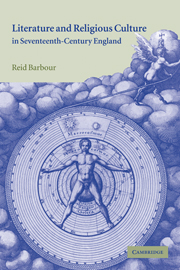Book contents
- Frontmatter
- Contents
- Acknowledgements
- Introduction: spirit and circumstance in Caroline Protestantism
- Chapter 1 The church heroic: Charles, Laud, and Little Gidding
- Chapter 2 Great Tew and the skeptical hero
- Chapter 3 Between liturgy and dreams: the church fanciful
- Chapter 4 Respecting persons
- Chapter 5 Decorum and redemption in the theater of the person
- Chapter 6 Nature (I): post-Baconian mysteries
- Chapter 7 Nature (II): church and cosmos
- Conclusion: Rome, Massachusetts, and the Caroline Protestant imagination
- Notes
- Index
Chapter 5 - Decorum and redemption in the theater of the person
Published online by Cambridge University Press: 22 September 2009
- Frontmatter
- Contents
- Acknowledgements
- Introduction: spirit and circumstance in Caroline Protestantism
- Chapter 1 The church heroic: Charles, Laud, and Little Gidding
- Chapter 2 Great Tew and the skeptical hero
- Chapter 3 Between liturgy and dreams: the church fanciful
- Chapter 4 Respecting persons
- Chapter 5 Decorum and redemption in the theater of the person
- Chapter 6 Nature (I): post-Baconian mysteries
- Chapter 7 Nature (II): church and cosmos
- Conclusion: Rome, Massachusetts, and the Caroline Protestant imagination
- Notes
- Index
Summary
At their best, the circumstances of heroism and fancy were believed to elevate English Protestantism. But no matter how much the circumstance of persons might factor into Caroline conditions for isolating and exalting the saint, church, or minister, the preoccupation with its complexities induced writers to consider the status of their Protestantism as implanted very much in the stage-play world. In the 1620s and 30s, the handbooks of manners, social comedies, and sermons address the problem of how the rejection of personal respects so critical to the God of the Bible can be reconciled with the social decorum so integral to early Stuart society. Whether it is Shirley staging comedies about the “town” or Donne preaching of conflict between a corporate and isolated soul, Caroline writers take stock of the proprieties governing their society.
So it is that the advocates of the Feoffees of Impropriations and, in general, of lay involvement in church affairs were compelled to grapple with the injunction against respecting persons as the Bible most often poses it: in social and economic terms. With St. Paul as their model, godly Christians attempted (in the words of Haller) “to adapt their teaching to the spiritual condition of all men” in a kind of “spiritual egalitarianism,” the very essence of which was God's disregard for persons, Jew or Gentile.
- Type
- Chapter
- Information
- Literature and Religious Culture in Seventeenth-Century England , pp. 151 - 175Publisher: Cambridge University PressPrint publication year: 2001

